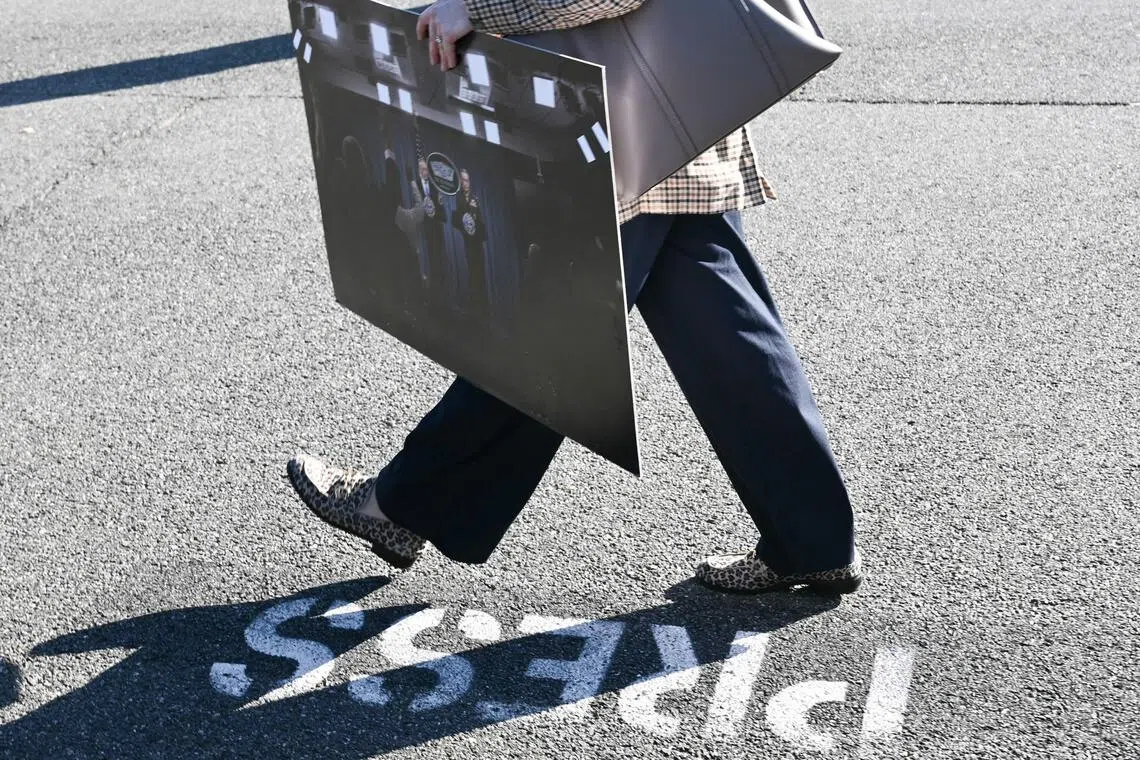Pentagon journalists vacate workspace as new restrictions take effect
Sign up now: Get ST's newsletters delivered to your inbox

Some journalists interviewed by Reuters said the new restrictions will not keep them from reporting on the US military.
PHOTO: AFP
Follow topic:
NEW YORK/ WASHINGTON - Dozens of journalists who cover the US Defence Department vacated their offices in the Pentagon and returned their credentials on Oct 15 as new restrictions on press access took effect.
The Defence Department had set an Oct 14 deadline for news outlets to either sign a new Pentagon access policy or lose access to press credentials and Pentagon workspaces.
At least 30 news organisations, including Reuters, declined to sign the new policy
The policy requires journalists to acknowledge new rules on press access, including that they could be branded security risks and have their Pentagon press badges revoked if they ask department employees to disclose classified and some types of unclassified information.
The Pentagon Press Association, which represents more than 100 news organisations, including Reuters, said in a statement that Oct 15 was “a dark day for press freedom that raises concerns about a weakening US commitment to transparency in governance, to public accountability at the Pentagon and to free speech for all”.
Chief Pentagon spokesperson Sean Parnell said in a statement on Oct 13: “The policy does not ask for them to agree, just to acknowledge that they understand what our policy is.
“This has caused reporters to have a full blown meltdown, crying victim online. We stand by our policy because it’s what’s best for our troops and the national security of this country.”
The Pentagon declined to make additional comment on Oct 15.
Journalists described the press area at the Pentagon on Oct 15 as unusually quiet, as they removed furniture, computer servers, TV studio soundproofing material and other contents.
“I’ve never seen that place not buzzing like a beehive,” said Mr JJ Green, National Security Correspondent at Washington news radio station WTOP.
Mr Green, who has worked as a national security correspondent for 20 years, turned in his press credential on the morning of Oct 15. Television outlets have until Oct 17 to remove their gear.
Credentialed reporters have traditionally been limited to unclassified spaces in the Pentagon and have worked across the hallway from the Pentagon press office, which has allowed them access to department spokespeople. Press badges signify that they have gone through a background check.
“We’ve never been allowed to just bolt right on into classified areas or people’s offices,” said Mr Stephen Losey, a reporter who covers the Air Force for Defence News. “I don’t know anybody who would purposely eavesdrop or anything like that, which is what some people have made it seem like we’re doing.”
Some journalists interviewed by Reuters said the new restrictions will not keep them from reporting on the US military.
“The irony of irony is that Pentagon reporters are not having conversations about controlled information in the hallways,” said a member of the Pentagon Press Association speaking on condition of anonymity.
“We’re doing it over (the encrypted app) Signal.”
The Pentagon’s new policy is the latest expansion of restrictions on press access under Defence Secretary Pete Hegseth, a former Fox News host.
Fox News is among the news organisations that have refused to sign on to the new press restrictions. REUTERS

